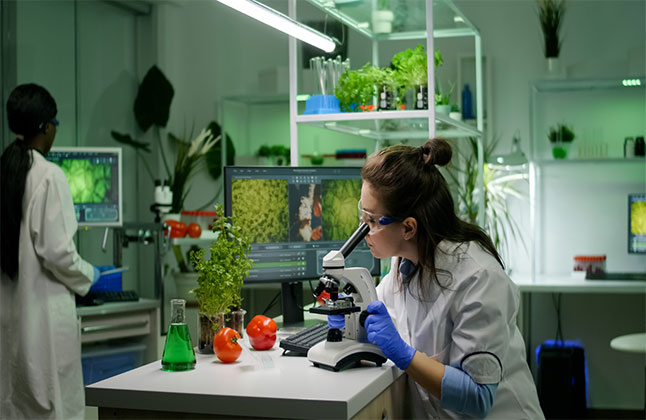Know All About Studying Biotechnology and Biomedical Sciences in the USA
Key Differences: Biotechnology is defined as "any technological application that uses biological systems, living organisms, or derivatives thereof, to make or modify products or processes for specific use" and refers to the utilisation of living systems and organisms in the development or production of useful products.
The term "biomedical" refers broadly to the application of engineering and technological concepts to the study of biological or living systems.
Innovative approaches to biology, materials, processes, devices, implants, and informatics are being developed for disease prevention, diagnosis, and treatment, patient rehabilitation, and overall health enhancement.
The facts, theories, and models that describe biological and clinical phenomena—as well as other topics including physiology, virology, biochemistry, molecular biology, and proteomics—are the primary focus of biomedical engineering. It is the most frequently used in the creation of engineering answers for fields related to biology and medicine.
Although they differ, biotechnology and biomedical engineering do have some overlap. Both are emerging industries with promising job prospects. In general, biomedical engineering might be a better option for students who are interested in medicine; on the other hand, biotechnology might be a better fit for students who are more interested in biology and microbiology.

Differences in courses and core areas:
Biotechnology: This covers a wide range of topics and study areas, primarily molecular cell biology, bioinformatics, biochemistry, systems biology, and statistics. These subjects and studies introduce students to the basic ideas of modern biology, including cell biology, data handling and experimental techniques, genomics, and proteomics. To solve challenges in the healthcare industry, the student will need to have a basic understanding of biology and traditional engineering disciplines. It also encompasses an understanding of engineering, mathematics, the basic sciences, and life sciences.
Biomedical sciences: The focus is to develop unique innovative teaching methods in biology, materials, processes, impacts, and informatics approaches to help in the in the prevention, diagnosis, treatment, and prevention of diseases. The study mainly involves bioinstrumentation, nanomaterials, imaging, and biomedical devices. This helps students learn and be prepared for the industry early on.
Career scope
Biomedical science: The biggest success in this field is vaccines, agriculture, cloning, biofuels, industrial enzymes, and drugs. The area covers diverse subjects like genetics, microbiology, molecular and cell biology, biochemistry, etc. The programme is designed to explore various possibilities, mostly in health care, medical equipment manufacturers, and scientific research.
Biotechnology: Biotechnology has a vast scope in healthcare, agriculture, the environment, pollution control, waste management, mining, energy production, forestry, aquaculture, and many related fields. Coming to modern terminology, biotechnology is a field with many specialisations that comes with teaching with modern technologies. With time, the demand for biotechnology is increasing due to the increased awareness of healthcare systems.
The top 5 universities for biotechnology and biomedical science
Here are the top 5 universities in USA that are known for their top biotechnology and biomedical programmes.
- Stanford University
- Massachuttes Institute of Technology (MIT)
- John Hopkins University
- Harvard University
- University of California, San Francisco (UCSF)
Eligibility criteria
- A student must have completed a high school diploma or equivalent (in case enrolled in a bachelor’s program) and a bachelor’s degree or equivalent in case enrolled in a master’s program.
- Universities want the students to appear for English language proficiency tests like IELTS, TOEFL, or any standardised tests. Additionally, the students might have to appear for the Graduate Record Examination (GRE) or Graduate Management Admission Test (GMAT) if enrolled in an MBA programme.
- Most of the programmes require the students to submit letters of recommendation.
- Applicants are supposed to submit a statement of purpose or personal statement that outlines their academic background, research interests, career goals, etc., along with their CV or resume.
- Depending on the level of the programme, students can submit a portfolio of their research work, including writing samples.
Job prospects
For further assistance or queries students can contact us, Edwise International and avail our wide range of services for students on destinations like study in UK, study in USA, study in Canada, study in Australia, study in New-Zealand, study in Singapore, study in Ireland and many other countries.

Back to All "Overseas Education Articles, Resources, Tips and Tricks"